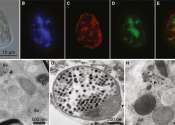Machine learning method reveals chromosome locations in individual cell nucleus
Researchers from Carnegie Mellon University's School of Computer Science have made a significant advancement toward understanding how the human genome is organized inside a single cell. This knowledge is crucial for analyzing ...









